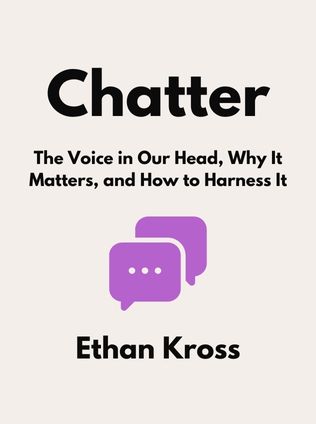
Chatter
The Voice in Our Head, Why It Matters, and How to Harness It
By Ethan Kross
Published 01/2021
About the Author
Ethan Kross is a renowned neuroscientist and experimental psychologist who has dedicated his career to exploring the intricacies of the human mind. As the director of the Emotion & Self Control Laboratory at the University of Michigan, Kross has spent years delving into the nature of self-talk—those silent, often critical, conversations we have with ourselves. His work bridges the gap between neuroscience and psychology, making complex scientific concepts accessible to the general public. "Chatter" is his first book, and in it, Kross distills his research into practical strategies for managing the negative self-talk that often sabotages our happiness and success.
Main Idea
At the heart of "Chatter" is a simple yet profound idea: the way we talk to ourselves can either be our greatest ally or our worst enemy. Kross argues that the internal voice, which he refers to as "chatter" when it turns negative, has a profound impact on our mental health, relationships, and overall well-being. The book is a guide to understanding and managing this internal dialogue, transforming it from a source of anxiety and stress into a tool for achieving peace and success. By exploring the science behind self-talk and offering practical strategies, Kross empowers readers to take control of their inner voice and, by extension, their lives.
Table of Contents
- Introduction: The Power of Self-Talk
- The Origins of Chatter: Understanding the Internal Voice
- The Impact of Negative Self-Talk on Our Lives
- Strategies for Managing Chatter
- Seeking Amazement: Redirecting Your Attention
- Actionable Empathy: The Role of Others in Quieting Chatter
- Perspective Shifts: Changing the Narrative
- Building a Sense of Control
- The Power of Rituals
- Conclusion: Mastering Your Inner Voice
Introduction: The Power of Self-Talk
Right now, as you read these words, there's a conversation happening inside your head. It’s the same voice that praises you after a job well done and criticizes you when things don’t go as planned. This internal dialogue, known as self-talk, plays a crucial role in shaping your experiences, influencing everything from your mood to your performance in various aspects of life. But what happens when this voice turns against you, filling your mind with doubt and negativity? In "Chatter," Ethan Kross explores the detrimental effects of negative self-talk and offers strategies to quiet this internal critic, allowing you to harness the power of your inner voice for good.
The Origins of Chatter: Understanding the Internal Voice
Self-talk is not just another term for our thoughts. Kross defines self-talk as those thoughts that take the form of words or silent speech that we "hear" in our minds. This phenomenon is a natural part of being human, deeply rooted in our biology and shaped by our upbringing. Kross explains that the evolutionary purpose of self-talk likely lies in its ability to help us solve problems, plan for the future, and navigate social interactions. However, when this self-talk becomes negative, it can spiral into what Kross calls "chatter," a destructive force that undermines our mental and emotional well-being.
According to Kross, our capacity for self-talk is hard-wired into our brains, but it’s also influenced by external factors such as culture and upbringing. From a young age, we internalize the voices of those around us—parents, teachers, peers—creating a complex inner dialogue that reflects both our personal experiences and societal norms. This internal dialogue can be a double-edged sword. On one hand, it can guide us toward positive outcomes; on the other, it can lead us into a downward spiral of negative thinking.
The Neuroscience of Self-Talk
What happens in the brain when we engage in self-talk? Kross shares three key facts about the neuroscience behind our internal voice:
Sign up for FREE and get access to 1,400+ books summaries.
You May Also Like
The Subtle Art of Not Giving a F*ck
A Counterintuitive Approach to Living a Good Life
By Mark MansonRich Dad Poor Dad
What the Rich Teach Their Kids About Money - That the Poor and Middle Class Do Not!
By Robert T. KiyosakiHow To Win Friends and Influence People
The All-Time Classic Manual Of People Skills
By Dale CarnegieFreakonomics
A Rogue Economist Explores the Hidden Side of Everything
By Steven D. Levitt and Stephen J. Dubner



















